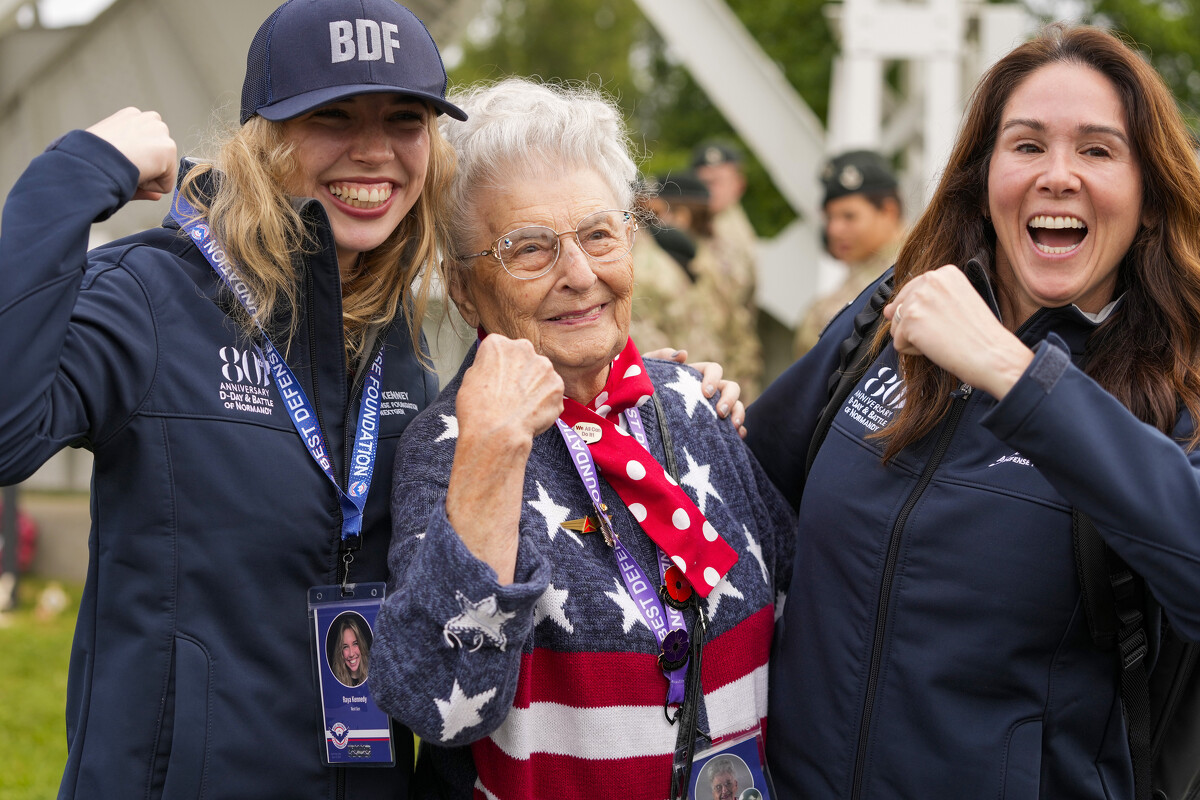
Anna Mae Krier, also known as a Rosie the Riveter, center, poses during a service at the Pegasus Bridge memorial in Benouville, Normandy, France, Wednesday, June 5, 2024. World War II veterans from across the United States as well as Britain and Canada are in Normandy this week to mark 80 years since the D-Day landings that helped lead to Hitler's defeat. (AP Photo/Virginia Mayo)
PEGASUS BRIDGE, France (AP) - When the 5,000th B-17 bomber built after Pearl Harbor rolled out of its Boeing factory, teenage riveter Anna Mae Krier made sure it would carry a message from the women of World War II: She signed her name on it.
Now 98, and in Normandy, France, for this week's 80th anniversary of the D-Day landings, Krier is still proudly promoting the vital roles played by women in the June 6, 1944, invasion and throughout the war - including by making weaponry that enabled men to fight.
Krier was among millions of women who rolled up their sleeves in defense-industry factories, replacing men who volunteered and were called up for combat in the Pacific, Africa and Europe.
The women had their own icon in "Rosie the Riveter," a woman in a polka-dotted bandanna flexing a muscular arm in a recruitment poster that declared: "We can do it!"
After Japan's surprise attack on Pearl Harbor that pitched the United States into war on Dec. 7, 1941, "every man, woman and child just went to work," Krier recalled Wednesday as she visited the site of an iconic D-Day battle, Pegasus Bridge.
The North Dakota native was 17 when she went to work in 1943 as a riveter on B-17 and B-29 bombers. She helped build more than 6,000 aircraft, according to her biography provided by the Best Defense Foundation, which brought her to Normandy for the anniversary.
"Us women built all that equipment, the airplanes, the tanks, the ammunition" and ships used in the Allied invasion of Normandy that helped liberate Europe from Adolf Hitler's tyranny, Krier said.
She added: "We weren't doing it for honors and awards. We were doing it to save our country. And we ended up helping save the world."
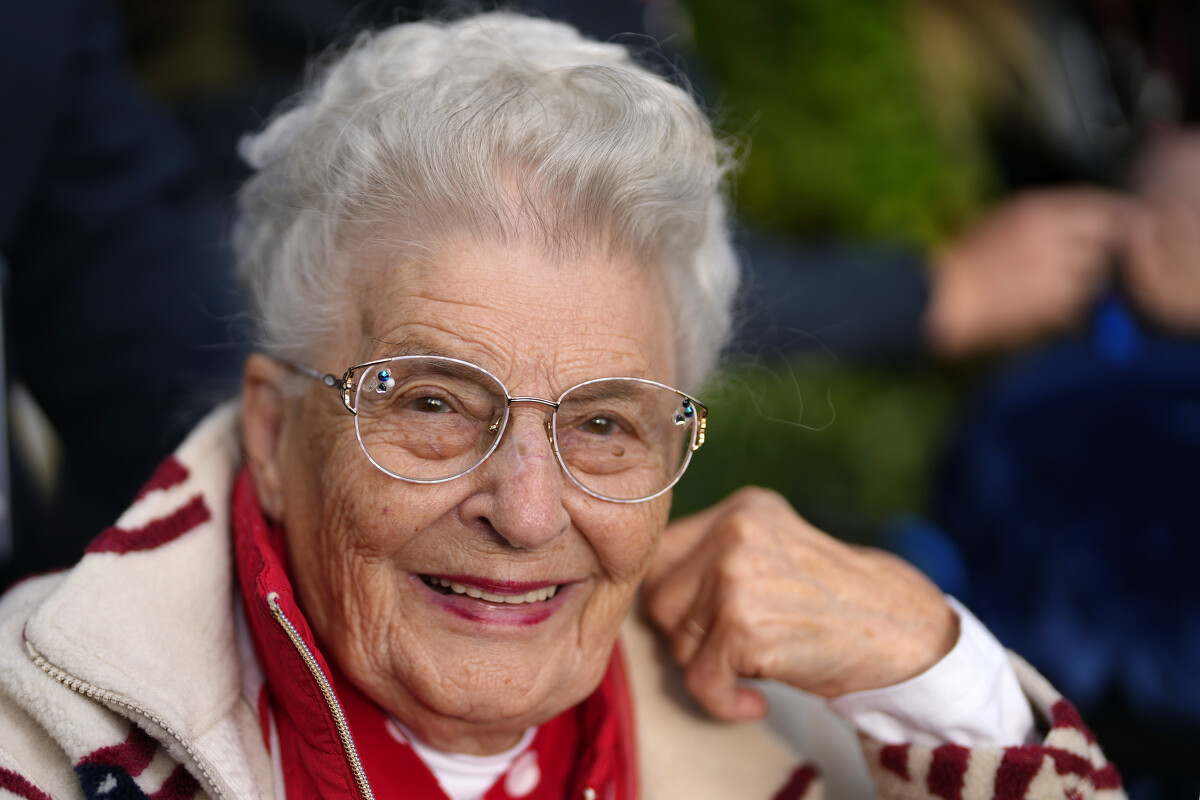
U.S. World War II veteran Anna Mae Krier visits the Normandy American Cemetery in Colleville-sur-Mer, France, Tuesday, June 4, 2024. World War II veterans from across the United States as well as Britain and Canada are in Normandy this week to mark 80 years since the D-Day landings that helped lead to Hitler's defeat. (AP Photo/Virginia Mayo)
Women flew the planes that women built, too.
The pioneering Women Airforce Service Pilots, known as WASPs, fulfilled an array of noncombat flight missions, including flying planes from factories on their way to the front, that freed male pilots for battle.
Thirty-eight of the women were killed in wartime service. Long considered civilians, not members of the military, they weren't entitled to the pay and benefits men received. Only in 1977, after a long fight, did they get veteran status, followed in 2010 with the Congressional Gold Medal, the highest civilian honor given by Congress.
Women defense workers also received little notice or appreciation at first. Krier was among ex-"Rosies" who pushed successfully for their contribution to be recognized with a Congressional Gold Medal.
"That made me so proud," she said. "And I'm just so proud of our young women. We opened doors for the young women today. But look what you women are doing. We're just so happy to see what you're doing with your lives. I think that's great."
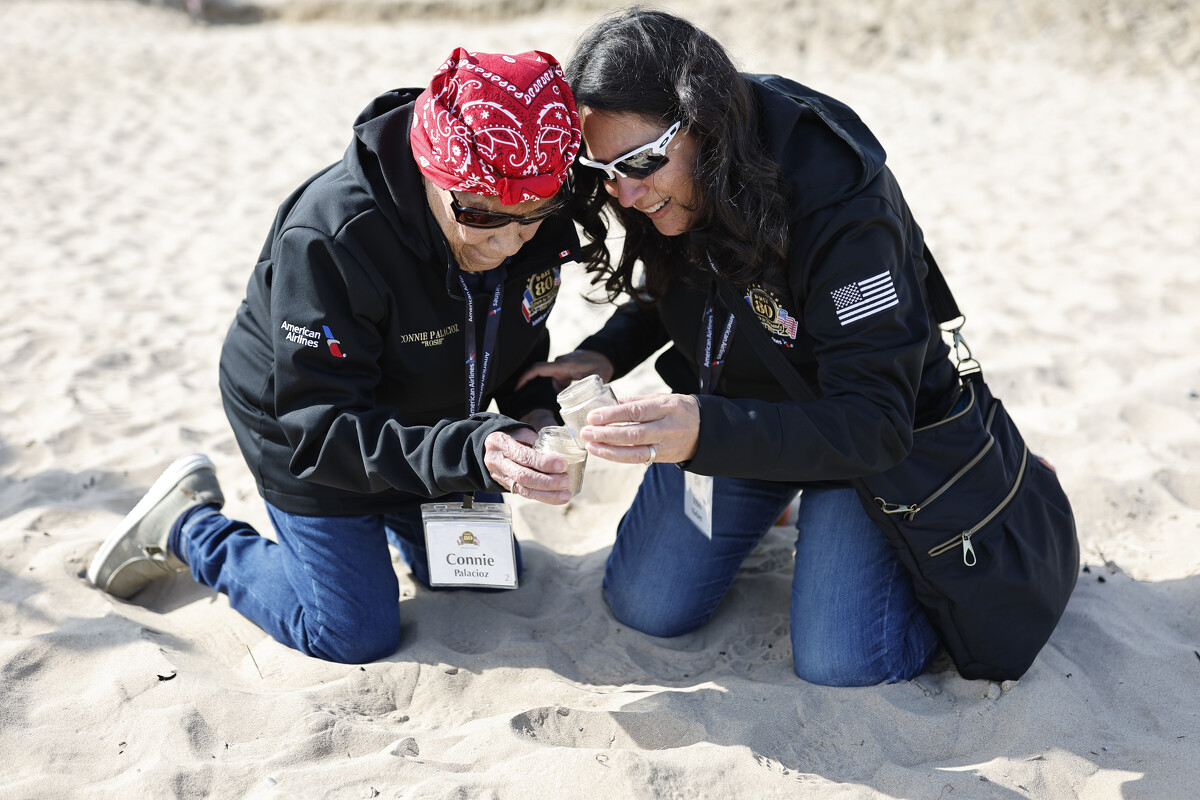
WWII veteran Connie Palacioz, left, collects sand on Omaha Beach, Tuesday, June 4, 2024 in Normandy. Veterans and world dignitaries gather in Normandy to commemorate the 80th anniversary of the landings. (AP Photo/Jeremias Gonzalez)
Connie Palacioz, another "Rosie" who punched rivets on the nose sections of B-29 bombers in Kansas, didn't tell her future family about the details of her wartime work because "I never thought it was important to (say) that I was a riveter."
The 99-year-old Palacioz is also in Normandy for the D-Day anniversary, part of a veterans group flown over by American Airlines.
"All the men were at the war. So us women had to do the job," she said. "So there was a lot of Rosie the Riveters."
___
Leicester reported from Port-en-Bessin-Huppain, France. AP journalists Theodora Tongas in Omaha Beach, France, and Alex Turnbull in Pegasus Bridge, France, contributed.
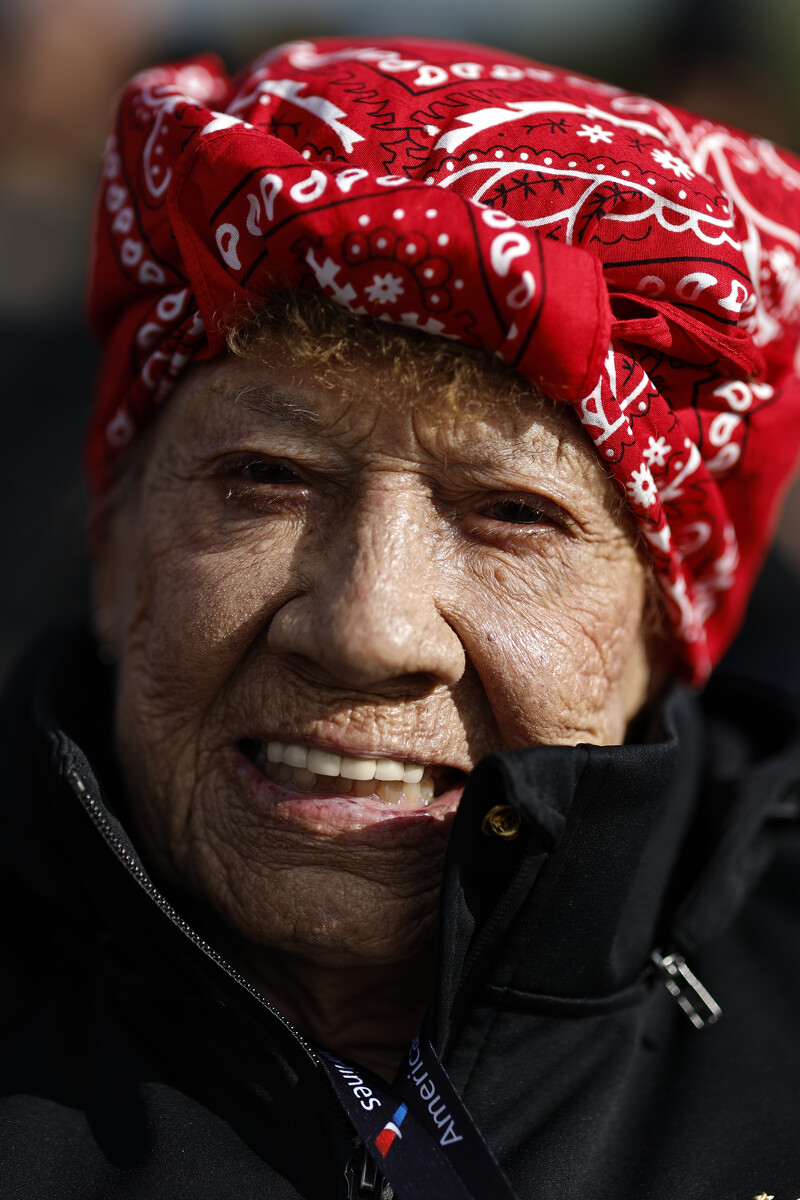
American WW II veteran Connie Palacioz attends a wreath-laying ceremony at Utah Beach, Wednesday, June 5, 2024 at Utah Beach, Normandy,. World War II veterans from across the United States as well as Britain and Canada are in Normandy this week to mark 80 years since the D-Day landings that helped lead to Hitler's defeat. (AP Photo/Jeremias Gonzalez)
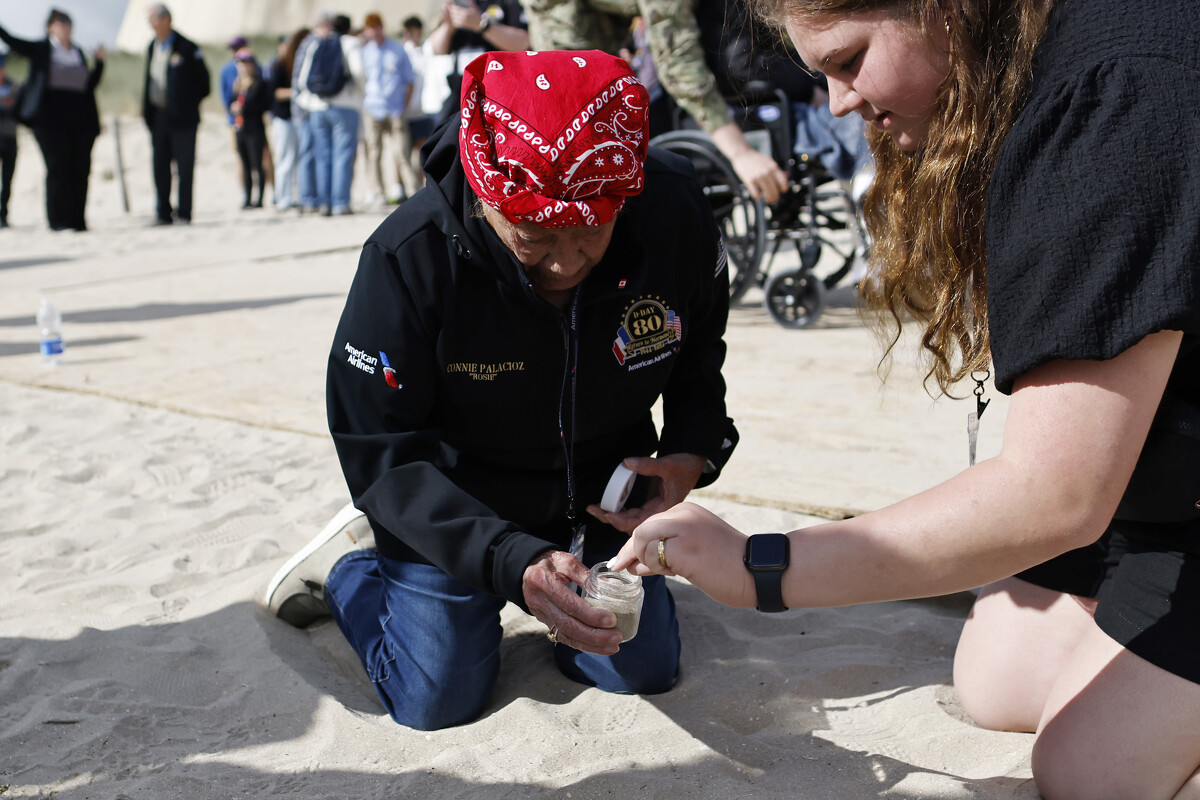
American WW II veteran Connie Palacioz is helped collecting sand during a wreath-laying ceremony at Utah Beach, Wednesday, June 5, 2024 at Utah Beach, Normandy,. World War II veterans from across the United States as well as Britain and Canada are in Normandy this week to mark 80 years since the D-Day landings that helped lead to Hitler's defeat. (AP Photo/Jeremias Gonzalez)
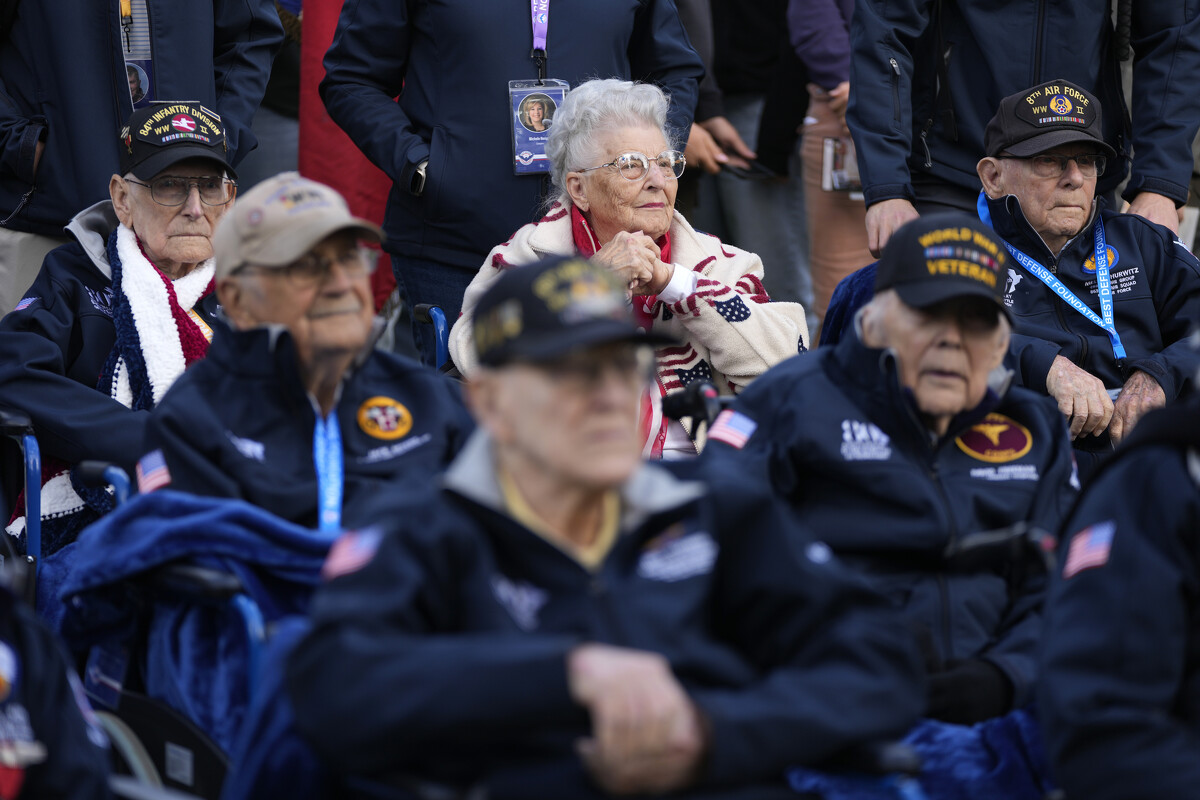
U.S. World War II veteran Anna Mae Krier, center rear, listens as she sits with other veterans during a service at the Normandy American Cemetery in Colleville-sur-Mer, France, Tuesday, June 4, 2024. World War II veterans from across the United States as well as Britain and Canada are in Normandy this week to mark 80 years since the D-Day landings that helped lead to Hitler's defeat. (AP Photo/Virginia Mayo)